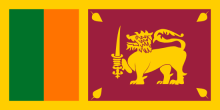An island nation of over 22 million people (World Bank, 2022), Sri Lanka is located off the southern coast of India and has high literacy rates and a strong network of non-governmental organisations.
COL’s work in Sri Lanka is primarily in the areas of girls’ and women’s education and training, higher education, teacher education, lifelong learning for farmers, and technology-enabled learning and benefits from programmes under the aegis of the Commonwealth Educational Media Centre for Asia (CEMCA). Learners from Sri Lanka are also participating in COL’s free online courses and benefitting from other openly available resources.



